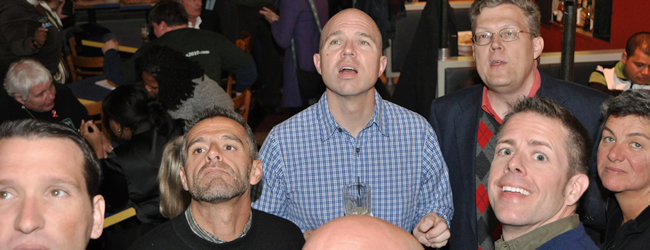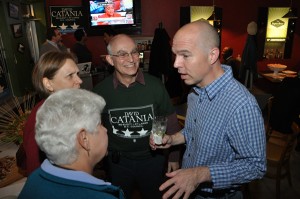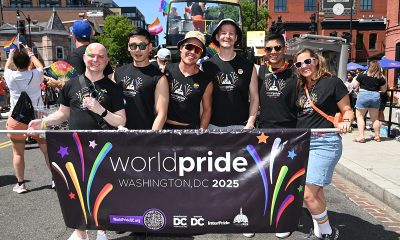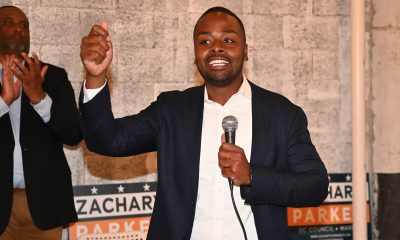Local
Catania, Graham breeze to victory; 7 gays win in Md.
Fenty write-in votes high in gay precincts


David Catania's re-election to D.C. Council was one of the few bright spots on an Election Day widely regarded as a disaster for gay rights. (Blade photo by Michael Key)
Pro-gay D.C. Council Chair Vincent Gray won his race for mayor with 73.9 percent of the vote and gay Council members David Catania (I-At-Large) and Jim Graham (D-Ward 1) easily won re-election Tuesday.
But an unauthorized write-in campaign for Mayor Adrian Fenty, who lost the Democratic mayoral nomination to Gray in the Sept. 14 primary, yielded high write-in vote counts in nearly all voter precincts with a high concentration of gay residents.
In Maryland, the number of out gay or lesbian members of the state legislature increased from four to seven in Tuesday’s election. Among the winners is Mary Washington, who captured a House of Delegates seat from Baltimore to become the first black lesbian to win a seat in the Maryland Legislature and the second to hold that distinction in the nation.
The “write-in” category in the D.C. mayor’s race won in at least two precincts with high concentrations of gays on Capitol Hill, highlighting the same racial divisions among voters that surfaced in the primary, where Gray won in majority black sections of the city and Fenty won in majority white areas.
Most of the gay precincts are in majority white sections, such as Dupont Circle, Adams Morgan, Logan Circle and Capitol Hill. Activists familiar with the LGBT community have said black gays, like their straight counterparts, supported Gray in overwhelming numbers. But because they are dispersed throughout the city and not concentrated in gay enclaves, like those in the mostly white areas, there are no known “black gay” precincts.
“I don’t think those are anti-Gray votes as much as they are pro-Fenty votes,” Catania said on Wednesday. “I think the vast majority of them, after the inauguration, those very same people will be very receptive to Vince and his message, and we’re all going to come back together.”
In his victory speech late Tuesday night at Love nightclub in Northeast D.C., which once hosted the city’s black LGBT Pride festival, Gray reiterated his campaign theme of “one city,” saying his administration will work hard to build unity among D.C.’s diverse population groups.
Most of the city’s LGBT activist leaders joined the Gertrude Stein Democratic Club, the city’s largest LGBT political group, in backing Gray in the mayoral race.
Gray captured 73.9 percent of the citywide vote, with the “write-in” vote coming in second with 22.8 percent. However, in majority white Wards 1, 2, 3, and 6, the margin between the Gray and write-in vote was closer, with the write-in vote count rising to between 30 and 43 percent. In Precincts 89 and 90 on Capitol Hill, which are home to a sizable gay population, the write-in vote came to 50.3 percent and 50.5 percent respectively, with Gray receiving 46.3 percent and 45.5 percent.
In the majority black Wards 4, 5, 7, and 8, the write-in vote fell to single digits.
D.C. Board of Elections and Ethics executive director Pokey Suleman said the city’s election law bars the board from identifying the names of people receiving write-in votes unless they capture enough votes to win the race. Most election observers assume the vast majority of write-in votes in Tuesday’s mayoral election went to Fenty.
“I would presume that the majority is for Fenty but I would not presume all of them are,” Suleman said.
In the at-large Council race, Catania came in second behind Council member Phil Mendelson (D-At-Large) in a four-candidate contest where the highest two vote-getters win the seats. Mendelson, who has a strong record of support on gay issues, and Catania endorsed each other.
Mendelson received 58.3 percent, with Catania receiving 30.9 percent of the vote. Both came out far ahead of challenger David Schwartzman, the Statehood-Green Party candidate who supports LGBT equality; and anti-gay independent candidate Richard Urban, who called for repeal of the city’s same-sex marriage law. Schwartzman received 6.8 percent and Urban received 5.1 percent. Non-Democratic candidates who win at-large seats traditionally have received less votes than the Democratic candidate in a city where the overwhelming majority of voters register as Democrats.
In the Ward 1 Council race, Graham received 81.3 percent of the vote compared to his gay Republican challenger, Marc Morgan, who received 7.6 percent of the vote. Statehood-Green Party candidate Nancy Shia received 9.5 percent.
Ward 5 Council candidate Tim Day, who became the fourth out gay candidate running for a D.C. Council seat this year, lost to incumbent Council member Harry Thomas, a Democrat, by a lopsided margin of 84.0 percent to 5.9 percent.
Day received the endorsement of the Washington Post. He drew additional news media coverage by disclosing IRS and D.C. corporation office records showing that a charitable constituent group that Thomas had been operating for many years did not have a tax exemption from the IRS and lost its corporate status from the city. The Post criticized Thomas over his handling of the charitable group. But the flap over the group did not help Day, an accountant, garner much support from voters.
Thomas has been a supporter of LGBT rights and voted for the same-sex marriage law, triggering organized opposition to his candidacy from church groups and the anti-gay National Organization for Marriage.
LGBT activists called the effort by some local religious leaders to target all Council members up for election this year because of their support for the same-sex marriage bill a total failure.
“In the end, it wasn’t the contentious issue that the opponents predicted,” said Mendelson, who also was targeted for his support for the gay marriage bill. “I can’t tell you how many candidate forums I went to where the issue of marriage equality did not come up,” he said.
“It’s striking that the opposition to marriage equality never got any traction in this election in spite of their intense rhetoric,” he said.
In the Maryland election, incumbent state Sen. Richard Madaleno of District 18 in Montgomery County won re-election with 74.5 percent of the vote.
House of Delegates incumbents Anne Kaiser (District 14), which includes Silver Spring, Olney, and Damascus; Heather Mizeur (District 20), which includes parts of Silver Spring and Takoma Park; and Maggie McIntosh (District 43), which includes parts of Baltimore, each won re-election by comfortable margins.
Washington, who ran in District 43, which has three seats, came in third with 31.6 percent of the vote. The highest three vote-getters win House of Delegates seats in most districts, which have three seats per district.
The other out gay or lesbian challengers who won on Tuesday were Luke Clippinger (District 46), which includes parts of Baltimore; and Bonnie Cullison (District 19), which includes parts of Montgomery County.
Most gay ANC candidates win races
Twenty-four of the 29 D.C Advisory Neighborhood Commission candidates identified by the Gertrude Stein Democratic Club as gay or lesbian or allies of the LGBT community won their races Tuesday. Fourteen of the winners are incumbents.
Three incumbents lost their seats in what observers called unexpected wins by their challengers. Among them were longtime ANC 6D07 Commissioner Robert “Bob” Siegel, who lost his Washington Nationals Stadium area seat to challenger David Garber. Garber had the endorsement of Council member Tommy Wells (D-Ward 6). In Ward 5, gay ANC 5C07 Commissioner Barrie Daneker lost to challenger James Fournier.
Gay incumbent Michael Patterson in ANC District 6B09 lost to challenger Brian Flahaven.
Following is a list of the ANC candidates, both incumbents and challengers, listed by the Stein Club as members or allies of the LGBT community. Candidates marked by an asterisk indicate they are either leading or trailing, and the final outcome won’t be determined until absentee and challenged ballots are counted.
Juan Lopez (1B07)—won
Bill O’Field (1C02)—lost
Mike Feldstein (2B01)—won
Jack Jacobson (2B04)–won
Victor Wexler (2B05)—won
Mike Silverstein (2B06)—won
Phil Carney (2B07)—won
Ramon Estrada (2B09)—leading by 39 votes*
Alexander “Alex” Padro (2C01)—won
Michael Benardo (2F06)—won
Lee Brian Reba (3C01)—won
Tom Smith (3D02)—won
Bob Summersgill (3F07)—won
Michael Yates (4C01)—won
Joseph Martin (4C09)—won
Thalia Wiggins (5B06)—won
Mary Lois Farmer-Allen (5C06)—won
Barrie Daneker (5C07)—lost
Adam Healy (6A01)—won
Neil Glick (6B08)—leading by 9 votes*
Michael Patterson (6B09)—lost
Larry Frankel (6B10)—lost
Brian Cox (6C05)—trailing by 13 votes*
Bill Crews (6C07)—won
Andy Litsky (6D04)—won
Roger Moffatt (6D05)—won
Robert “Bob” Siegel (6D07)—lost
Zina Williams (7B02)—won
Catherine Woods (7C03)—won
Virginia
Walkinshaw wins Democratic primary in Va. 11th Congressional District
Special election winner will succeed Gerry Connolly

On Saturday, Fairfax County Supervisor James Walkinshaw won the Democratic primary for the special election that will determine who will represent Virginia’s 11th Congressional District.
The special election is being held following the death of the late Congressman Gerry Connolly, who represented the district from 2008 until 2024, when he announced his retirement, and subsequently passed away from cancer in May.
Walkinshaw is not unknown to Virginia’s 11th District — he has served on the Fairfax County Board of Supervisors since 2020 and had served as Connolly’s chief of staff from 2009 to 2019. Before he passed away, Connolly had endorsed Walkinshaw to take his place, claiming that choosing Walkinshaw to be his chief of staff was “one of the best decisions I ever made.”
The Democratic nominee has run his campaign on mitigating Trump’s “dangerous” agenda of dismantling the federal bureaucracy, which in the district is a major issue as many of the district’s residents are federal employees and contractors.
“I’m honored and humbled to have earned the Democratic nomination for the district I’ve spent my career serving,” Walkinshaw said on X. “This victory was powered by neighbors, volunteers, and supporters who believe in protecting our democracy, defending our freedoms, and delivering for working families.”
In addition to protecting federal workers, Walkinshaw has a long list of progressive priorities — some of which include creating affordable housing, reducing gun violence, expanding immigrant protections, and “advancing equality for all” by adding sexual orientation and gender identity to the Fair Housing Act.
Various democratic PACs contributed more than $2 million to Walkinshaw’s ad campaigns, much of which touted his connection to Connolly.
Walkinshaw will face Republican Stewart Whitson in the special election in September, where he is the likely favorite to win.
Maryland
LGBTQ suicide prevention hotline option is going away. Here’s where else to go in Md.
Changes will take effect July 17

By ANNA RUBENSTEIN | The national suicide prevention hotline will no longer offer specialized support to LGBTQ people, starting July 17, the Trump administration announced last week.
Dialing the hotline at 988 will still be available for crisis support. But callers will no longer be able to reach specific LGBTQ services by pressing Option 3. The change worries advocates because their data shows the LGBTQ community has a disproportionally high suicide rate.
Even after the option ends, here’s how to receive tailored support if you’re in Maryland.
The rest of this article can be found on the Baltimore Banner’s website.
Maryland
Silver Spring holds annual Pride In The Plaza
‘Today means inclusion. It means to build resilience’

Silver Spring’s annual Pride in the Plaza event took place on Sunday to celebrate the LGBTQ community and emphasize inclusion and resilience.
“Today means inclusion. It means to build resilience, love,” Robyn Woods, program and outreach director for Live In Your Truth, which organized the event, said. “I mean, just being surrounded by the community and so many great entrepreneurs, business owners, and just being a part of this whole rainbow coalition that we call the LGBTQIA to be about.”
With the event being her first time organizing for Live In Your Truth, Woods said she felt emotional to see the support and love at the event.
“Some people (are) bringing out their children, their babies, their grandparents,” Woods said. “It’s a lot more allies here than anything else. That type of support to me means so much more than just support from my community; just outside support, inside support, so much support around it, so much love. Everyone’s smiling outside, helping each other.”
Attendees of the event were able to head over to the Family Fun Zone, an air-conditioned Pride Cool Down Lounge, or watch live drag performances in the main stage area.
Along with entertainment and a shaved-ice stand, rows of information tables stood along the plaza, including FreeState Justice, the Washington Spirit, Trans Maryland, Moco Pride Center, and the Heartwood Program, an organization that offers support, therapy, education, and resources to the LGBTQ community.
“I want people to know about our services, and I love what we have to offer,” Jessica Simon, psychotherapist for Heartwood Program’s Gender Wellness Clinic, said. “I (also) want to be part of a celebration with the community, and so it feels good to be here with other people who have something they want to give to the community.”
She added that within today’s political climate, to which she called an “antidote to shame,” it’s important to be celebrating Pride.
“There’s a lot of demonization of LGBTQI people,” Siena Iacuvazzi, facilitator for Maryland Trans Unity, said. “(Pride) is part of the healing process.”
Iacuvazzi said she was taught to be ashamed of who she was growing up, but being a part of a community helped her flourish in the future.
“I was taught how to hate myself. I was taught that I was an abomination to God,” she said. “But being a community is like understanding that there are people who have experienced the same thing, and they’re flourishing. They’re flourishing because they’re willing to stand up for themselves as human beings and discover themselves and understand what’s true for themselves.”
She added that Pride allows for a mutual understanding to take place.
“It’s more of a sense of belonging … and just taking that home and understanding you’re not alone,” Iacuvazzi said. “We’re each taking our own journey — we’re not putting that on each other. It’s just walking away with a sense of belonging and humanity.”
Similar to Iacuvazzi, Woods said she hopes attendees’ biggest takeaways would be family, fun, resilience, and pride.
“Being proud of yourself, being happy for who you are, and representation and how much it matters,” she continued. “And I think all these young people that are walking around here get to see versions of themselves, but older. They get to see so many different lesbian, gay, bisexual, pansexual people that are successful, that are showing love, that care, and it’s not how we’re portrayed in the media. It’s lovely to see it out here. (It’s) like we’re one big old, happy family.”
-

 U.S. Supreme Court5 days ago
U.S. Supreme Court5 days agoSupreme Court upholds ACA rule that makes PrEP, other preventative care free
-

 U.S. Supreme Court5 days ago
U.S. Supreme Court5 days agoSupreme Court rules parents must have option to opt children out of LGBTQ-specific lessons
-

 Television5 days ago
Television5 days ago‘White Lotus,’ ‘Severance,’ ‘Andor’ lead Dorian TV Awards noms
-

 Music & Concerts5 days ago
Music & Concerts5 days agoBerkshire Choral to commemorate Matthew Shepard’s life












